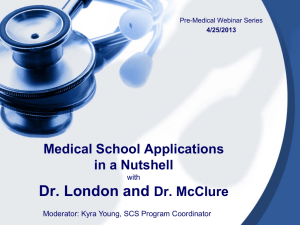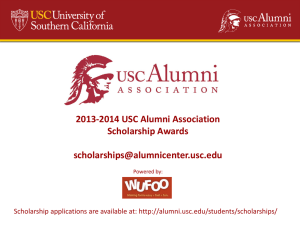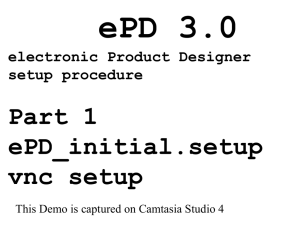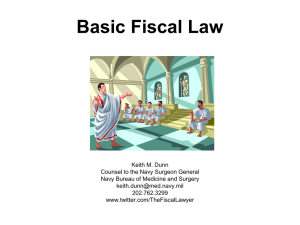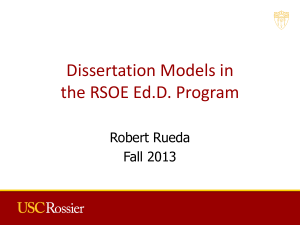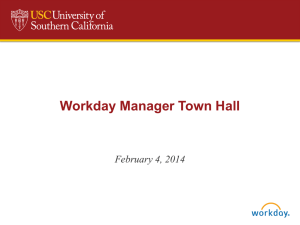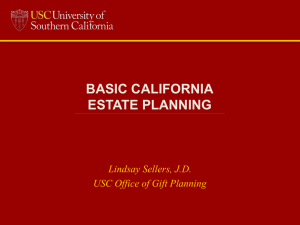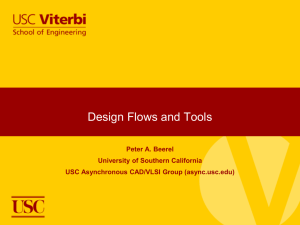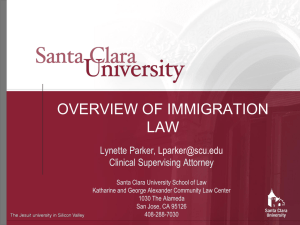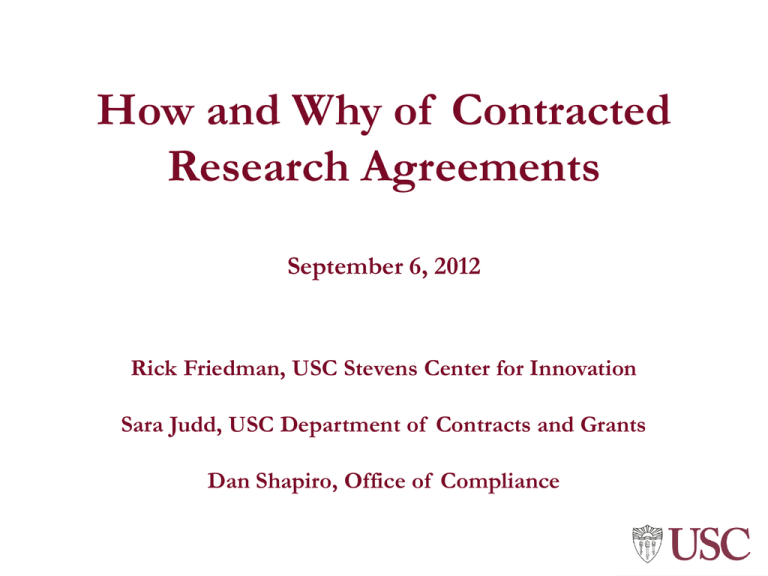
How and Why of Contracted
Research Agreements
September 6, 2012
Rick Friedman, USC Stevens Center for Innovation
Sara Judd, USC Department of Contracts and Grants
Dan Shapiro, Office of Compliance
Perhaps the most important thing you will do all day…
Learning Objectives
At the end of this session you will be able to:
•
Understand benefits and challenges of University/Industry
collaborations
•
Identify activities funded by gifts, grants and contracts to USC
•
Describe the characteristics of a gift, grant and contract
•
Understand the lifecycle of an award
•
Understand roles and responsibilities as they relate to research
agreements
•
Understand the key principles, policies and the process for research
agreements at USC
•
Understand key contract terms and why they are important
•
Identify important issues related to consultancy and other direct
personal relationships with industry
3
Learning Objectives
At the end of this session you will be able to:
•
Understand benefits and challenges of University/Industry
collaborations
•
Identify activities funded by gifts, grants and contracts to USC
•
Describe the characteristics of a gift, grant and contract
•
Understand the lifecycle of an award
•
Understand roles and responsibilities as they relate to research
agreements
•
Understand the key principles, policies and the process for research
agreements at USC
•
Understand key contract terms and why they are important
•
Identify important issues related to consultancy and other direct
personal relationships with industry
4
First, a brief overview…
USC’s Research Goals
• Preventing, detecting and curing diseases
prior to causing human harm.
• Capturing and distributing energy supplies that are environmentally benign,
economical and long-lasting.
• Securing the nation and the world against the risk of both natural disasters and
intentional acts of terrorism.
• Enhancing cross-cultural understanding and cooperation through communication
among civic, religious, ethnic, community institutions.
• Educating our children and adults for a deeper understanding of science and
math, languages and cultures, leadership, and justice.
http://www.usc.edu/research/about
5
How Does USC Measure Up?
• USC has over $600 million in annual research expenditures, and has
ranked among the top 10 private universities in federal supported
research activity.
• Ranked #9 for total R&D Expenditures at private universities and
colleges according to the National Science Foundation
• Ranked #23 of national universities according to U.S. News and World
Report, America’s Best Colleges
http://www.usc.edu/research/about/
6
7
FY12 Research Dollars by School
Total Amount in Millions: $534
Dornsife
14%
ICT
7%
Keck
37%
25%
15%
8
Benefits of Industry/University Collaboration
• Opportunity for faculty to apply “cutting edge” solutions to “real
world” problems
• Enhance teaching and research experience
• Provide students with valuable
educational opportunities and
gain marketability
9
Benefits of Industry/University Collaboration
• As federally funded research dollars continue to decrease, we must
pursue opportunities to increase non-federal funding sources
• Develop relationships that might lead to additional funding
– Support new or ongoing research
– Expand body of knowledge
• Facilitate informal technology transfer
– Move research results
toward market place or practical
application to benefit the public
• Stimulate state and national economy
10
Difference in Frameworks
Industry
University
• Primary aim is return to
shareholders
• Competitive advantage through
confidentiality and proprietary
nature of products and systems
• Top down management
• Sustain operations with product
and service sales
• Primary aim is education,
expanding knowledge and social
good
• Reputation is most valuable asset
• Decentralized and consensus
driven
• Values the freedom of inquiry
• Sustain operations with tuition,
gifts and external research
funding
11
The Goal
To bridge the gap.
12
Learning Objectives
At the end of this session you will be able to:
•
Understand benefits and challenges of University/Industry
collaborations
•
Identify activities funded by gifts, grants and contracts to USC
•
Describe the characteristics of a gift, grant and contract
•
Understand the lifecycle of an award
•
Understand roles and responsibilities as they relate to research
agreements
•
Understand the key principles, policies and the process for research
agreements at USC
•
Understand key contract terms and why they are important
•
Identify important issues related to consultancy and other direct personal
relationships with industry
13
Project Types
The University of Southern California
Mission
Teaching
Artistic Creation
&
Professional Practice
Research
Public
Service
•
•
•
•
•
•
Research
Public service
Training
Instruction
Travel
Conferences
Commercial
Testing
Funding Mechanisms
• Gifts
• Grants
• Contracts
15
University
Advancement
Gifts
Grants
Contracts
Whatever
What is a Gift?
• An unconditional, voluntary, non‐reciprocal
transfer of assets (including unconditional
promises) from a private entity to a not-forprofit organization. The donor may have certain
expectations but there cannot be any actual
control over expenditure of funds or any quid
pro quo. The donor may not benefit from the
execution of the gift. The gift’s purpose or use
may be restricted or unrestricted.
What Characterizes a Gift?
• Given in the spirit of “Disinterested Generosity” (IRS term)
• No contractual obligations or deliverables
(no language about disposition of
intellectual property rights, data
ownership detailed progress reports
or auditable financial reports)
• Awarded irrevocably
18
…versus a Grant?
Grants usually include:
• Specified performance period
• Obligation to return unobligated balance
• Specific scope of work
• Financial reports
• Detailed technical/progress report
or other work product
• The right to audit
• Other contractual obligations
(e.g., patent rights, indemnification, publication review)
19
What is a contract and what does it do?
• Creates mutual obligations between parties
• Addresses issues of “what if ’s”
• Defines boundaries of relationship and allocates liabilities
Ultimate Goal: Secure a contract that achieves critical interests
of both parties, and creates the foundation for a successful
relationship between the parties.
Why is it sometimes difficult to tell?
• Documents may not use clear or consistent language.
• Recipient’s expectations may not match award maker’s intentions.
• Award makers may think that if they are using funds budgeted
for philanthropic purposes that they are giving gifts regardless
of any restrictions.
21
Two Factors to Consider
1. Source of the donation
2. Intent of the donor
A grant is a type of funding awarded to the university to support
approved activity, including instruction, research, or public service.
A gift is a type of funding awarded to the university that may be
earmarked for a specific purpose, but the donor does not have specific
control over expenditures or work performed. A gift may not be from a
federal sponsor.
The line can become very blurry…
22
Contracts, Grants and Gifts…
What’s the difference?
Contract
Grant
Gift
Procurement/purchasing action
(bid process)
Awards of financial
assistance
Philanthropy
Negotiated or sponsor defined
work scope
PI defined work scope
Donor voluntarily makes to a
qualified organization
Period of performance
Period of performance
No donor-imposed conditions
or controls
Cost-reimbursement or fixed
price agreement
Cost-reimbursement
agreement
Donor letter or agreement
Specific deliverables, reports
and/or milestones; intellectual
property terms
Technical and financial
reports
No strings attached – no
deliverables; no legal rights
imparted re: IP, liability,
publication, etc.
Revocable in whole or in part
Revocable in whole or in
part
Irrevocable transfer
Specific rights reserved by
sponsor in award terms
Financial and performance
terms
May be unrestricted or
restricted to a specific
program (approved by USC)
Resources for applicable
regulations/standards/policies
•
•
•
•
Government Accounting Standards Board (GASB) – (www.gasb.org
Financial Accounting Standards Board (FASB) – (www.fasb.org
Internal Revenue Service (IRS) - (www.irs.gov )
Office of Management and Budget(OMB A‐21) –
(http://www.whitehouse.gov/omb/circulars_default)
• Council for Advancement and Support of Education (CASE) –
(www.case.org)
• University Advancement (http://campaign.usc.edu/about/universityadvancement)
For additional guidance regarding the determination of a gift vs. a grant or
contract, please contact the Department of Contracts and Grants
(www.usc.edu/research/dcg/)
Learning Objectives
At the end of this session you will be able to:
•
•
•
•
•
•
•
•
Understand benefits and challenges of University/Industry collaborations
Identify activities funded by gifts, grants and contracts to USC
Describe the characteristics of a gift, grant and contract
Understand the lifecycle of an award
Understand roles and responsibilities as they relate to sponsored research
agreements
Understand the key principles, policies and the process for research agreements
at USC
Understand key contract terms and why they are important
Identify important issues related to consultancy and other direct personal
relationships with industry
25
The Life Cycle of a Sponsored Award
DCG Proposal Review
Proposal Development
PI has an Idea
Funding
Opportunities
Preparation
Dept. Assists with:
- Budget
- Internal Forms
- Agency Forms
Approvals
- PIs
- Chair/Director
- Dean/V.P.
Submit
to
DCG
Review
Revised Budget & JIT Information
(approved by DCG)
Negotiation/Acceptance
Sponsored Projects Accounting (SPA)
Negotiation
Acceptance
Account setup
Establish Budget
Assign Funds
Transmittal
Project Management
Issued
to
DCG
Review
Signatures
Submit
to
Agency
Responsible Parties
DCG
Corrections
- Budget
- Approvals
- Commitments
- Compliance
Agency Review
Peer Review
Log in
Prioritize
Notice
Of
Award
26
- PI
-Department Chair
-Department Administrator
-DCG
-SPA
-Disbursement Control &
Accounts Payable
-Purchasing
- Human Resources
-Risk Management
-Equpment Management
-Facilities Management
-Internal Audit
Activities
- Scientific & technical
management
-Financial management
-Compliance
-Award negotiation
-Interpretation of
sponsor policies
-Award monitoring &
reporting
-Subrecipient monitoring
-Award closeout
What can I do to expedite the process???
• Timely submission of proposals/ all paperwork included,
including budget with overhead
• Advanced planning for regulatory approvals
– IRB/IACUC/CIRC
• Responsive to DCG during negotiation period to address
sensitive contract terms
27
Learning Objectives
At the end of this session you will be able to:
•
•
•
•
•
•
•
•
Understand benefits and challenges of University/Industry collaborations
Identify activities funded by gifts, grants and contracts to USC
Describe the characteristics of a gift, grant and contract
Understand the lifecycle of an award
Understand roles and responsibilities as they relate to sponsored research
agreements
Understand the key principles, policies and the process for research agreements at
USC
Understand key contract terms and why they are important
Identify important issues related to consultancy and other direct personal
relationships with industry
28
Audit
Office of
Research
Purchasing
Services
Dean’s
Office
Disbursement
Control &
Accounts
Payable
USC
Stevens
P.I.
Administering Unit
Equipment
Management
SPA
DCG
Office of Compliance
Principal Investigator
•
•
•
•
•
•
Scientific integrity and administrative management
Technical and management reports
Financial management
Subrecipient monitoring
Adhering to University policies
Adhering to award terms and conditions
30
Office of Research
University point of contact for these issues:
• Submission of research proposals
• Identifying sources of research funding
• Participation in, and initiation of, major inter-disciplinary University research
programs and formation of research units
• Education to prepare investigators for funding strategies and proposal
preparation
• Clearance for research competitions that limit the number of proposals
submitted by the University
• Financial disclosures or conflict of interest statements
• Complaints pertaining to research misconduct
http://www.usc.edu/research/
31
Department of Contracts & Grants
Strives to maintain the University's reputation as a responsible recipient
of sponsored support and provide high quality administrative services
•
•
•
•
•
•
•
Provide training and assistance to faculty and research administrators
Assist with proposal development, review, approval and submission
Delegated authority to endorse proposals for external funding on behalf of the
University
Negotiate and accept awards on behalf of the University
Offer post-award administrative guidance
Maintain the sponsored projects data
Provide support to University community in matters
related to research policy and guidelines
http://www.usc.edu/research/dcg/
32
USC Stevens Center for Innovation
Empowers USC innovators to make impact with their ideas:
• USC experts on intellectual property
• Manages university-owned IP (spends over $2M/yr on patents)
• Provides technology commercialization support through:
– Mentoring and gap funding programs
– Startup support, including team development and funding
– Technology marketing and IP licensing
• Also supports research efforts through
– Assisting DCG with IP terms of research contracts
– Notifying research sponsors of inventions and associated commercialization efforts
– Handling Material Transfer Agreements
http://stevens.usc.edu/
33
Office of Compliance
Our priority is to help the USC research community act as a responsible steward of federal and private research
support. Our services include:
• Providing guidance and facilitating solutions regarding research administration & compliance issues.
• Tracking new federal and state laws and regulations that may impact the research community.
• Partnering with the research community to develop new policies and guidance in emerging areas of risk
relevant to researchers and research administrators.
• Offering education to assist researchers and administrators in following the rules and regulations related to
the conduct and administration of research.
• Promoting scientific integrity by providing education, guidance, and oversight on issues like conflict of
interest and ethical behavior in the proposal, conduct, and reporting of research.
• Monitoring and auditing research compliance activity in partnership with Audit Services.
• Providing faculty & staff the ability to report concerns confidentially, & investigating as appropriate.
• Specific areas of expertise include, among others:
• Conflicts of Interest related to research
• Sponsor-specific compliance requirements
• Scientific integrity issues, including scientific misconduct, data management, and authorship
• Export controls (including compliance with ITAR, EAR, and OFAC)
• Regulations regarding financial management of sponsored research, such as effort reporting, charging of
administrative and clerical salaries and other expenses, recharge centers, and issues involving Institutional
Base Salary
• Research ethics training requirements and offerings 34
Sponsored Projects Accounting
(SPA)
Oversees post award administration of sponsored research for
the University. Responsibilities:
• Effectively manage awards for compliance with Federal, State, and Private
agency fiscal and reporting guidelines, University policy and procedures, and
with Generally Accepted Accounting Principles.
• Ensure the payment of obligations and the collection of funds with an
efficient cash management system.
• Encourage and facilitate proper management of sponsored funds through
training and development, streamlined
financial systems, and high professional standards.
http://fbs.usc.edu/depts/spa/
35
Purchasing Services
Operates as a centralized resource to all campus departments, and
ensures that goods and services are procured at the maximum value,
in compliance with applicable policies, laws and regulations, and in
accordance with best practices.
Responsible for:
• Conducting bids on behalf of departments
• Negotiating best-value contracts by leveraging USC's total purchasing power
• Selecting responsive and qualified suppliers
• Reviewing and signing vendor contracts
• Monitoring supplier-contract performance
• Issuing PO’s for subawards
http://fbs.usc.edu/depts/purchasing/
36
Disbursement Control & Accounts Payable
Responsible for processing and distributing payments for university business
related services and expenses.
•
•
•
•
•
•
•
•
•
Ensures expenditure compliance with applicable policies, laws and regulations
Administers university expenditure policies and maximum reimbursable rates
Accrues or pays sales tax on taxable items
Reviews and approves payment requests for cash advances, reimbursements, fellowships,
postdoctoral fellows, and student refunds
Issues invoice payments to suppliers
Processes independent contractor agreements and payments and issues 1099s
Processes relocation payments
Conducts procurement audits
Processes electronic deposit forms for reimbursements
and supplier payments
http://fbs.usc.edu/depts/DC/
37
Administering Unit
Assists PI with financial and administrative management of
award
• Accounting (Payroll, Travel, General Ledger)
• Purchasing (PR, Inventory)
• Report preparation
• Subrecipient monitoring
• Prior approvals (Rebudgeting, Travel,
No Cost Time Extension)
– Continuations, supplements, renewal
– Close-out
38
Your partners in the USC Research
Enterprise…who does what?
https://research.usc.edu/policies/responsibilities/
Delegation of Signature Authority
• Delegates the authority to solicit (via proposals) and accept sponsored
awards on behalf of The University of Southern California:
a. Executive Director, DCG
b. Director, DCG
c. Associate Directors, DCG
d. Principal Contract and Grant Officers, DCG
e. Senior Contract and Grant Officers, DCG
f. Contract and Grant Officers, DCG
PI &
Dept.
Admin.
40
Roles / Responsibilities Check
Which of the following has authority to negotiate and
accept sponsored awards on behalf of USC?
Purchasing Services
Sponsored Projects Accounting
Graduate students
PI’s
Department of Contracts and Grants (DCG)
Tommy Trojan
41
Department of Contracts & Grants
Administration
Jeri Muniz
Executive Director
Dorothy Steele
Data Specialist
Sapphire
Masterson
Account
Specialist
Amanda
Salazar
Closeout
Specialist
University of Southern California
Department of Contracts and Grants
Belinda Galvan
Cruz
Data Specialist
Cynthia
Garcia Arndt
Admin
Assistant
Lisa
Villaflores
Account
Specialist
Donna Obeid
Training
Specialist
Susan
Palomino
Closeout
Specialist
42
Sarah
Cusimano
Deputy Director
Ryan Tischler
Office
Manager
Gil Govea
Admin
Assistant
Layton
Hansen
Scanning
Technician
Noah
Congelliere
Scanning
Technician
UPC Team Structure
Sara Judd
Director
DCG
TEAM 2
TEAM 1
Ben Holstein
Principal C&G Officer
Industry
State/Local Govt
Intl
Special Agreements
Team Lead/Customer Service
POC
OPEN
Principal C&G Officer
Industry
State/Local Govt
Intl
Special Agreements
Team Lead/Customer Service POC
Katie Rountree
Senior C&G Officer
Nonprofit/Univ
OPEN
C&G Officer
Federal
Heather Kubinec
Senior C&G Officer
Nonprofit/Univ
Lauren Ferrell
Senior C&G Officer
Nonprofit/Univ
Nancy Levien
C&G Officer
Federal
Nicole Burelli
C&G Officer
Federal
Subaward Team
OPEN
C&G Officer
Outgoing subawards
Ivan Rukavina
C&G Officer
Outgoing subawards
University of Southern California
Department of Contracts and Grants
43
Vicki Iwata
C&G Officer
Federal
HSC Team Structure
Sara Judd
Director
DCG
Jean Chan
Associate Director
HSC
TEAM 2
TEAM 1
Colleen James
Principal C&G Officer
Industry
Industry
State/Local Govt
Intl
Special Agreements
Team Lead/Customer Service POC
Teri Hansen
Principal C&G Officer
Industry
State/Local Govt
Intl
Special Agreements
Team Lead/Customer Service POC
Linda Bakabak
Senior C&G Officer
Nonprofit/Univ
Lillian Rivera
C&G Officer
Federal
SUBAWARD TEAM
Michael Beltran
Principal C&G Officer
Outgoing Subawards
Team Lead
University of Southern California
Department of Contracts and Grants
Alice Young-Singleton
C&G44Officer
Outgoing Subawards
Steve Misuraca
Senior C&G Officer
Nonprofit/Univ
Jean Chan
C&G Officer
(Interim)
Federal
Marina Team Structure
Sara Judd
Director
DCG
Steve Mendiburu
Associate Director
DCG Marina
ICT UARC
Amechi Akpom
Principal C&G Officer
Marina Industry/
Marina State/local Govt
Marina Intl
Marina Other special Agreements
Andy Probasco
Senior C&G Officer
ISI Federal
Marina Outgoing Subawards
Mitali Ravindrakumar
C&G Officer
University of Southern California
Department of Contracts and Grants
Marina Nonprofit/Univ
45
Marina Account Setup
USC Stevens Center Contacts
Technology Advancement & Licensing
Life Sciences
Tim Tiemann, Assistant Director
ttiemann@usc.edu
Chris Moulding, Senior Manager
moulding@usc.edu
Vijay Dhaka, Senior Manager
dhaka@stevens.usc.edu
Bonnie Wolfe, Licensing Specialist
bonniep@usc.edu
Technology Advancement & Licensing
Physical Sciences
Hossein Pourmand, Assistant Director
hpourman@usc.edu
Ed Beres, Senior Manager
beres@usc.edu
John Sweet, Senior Manager
jsweet@stevens.usc.edu
New Ventures and Alliances
Karen Kerr, Senior Director
karenk@stevens.usc.edu
Annette Kleiser, Assistant Director, co-Director of CST
akleiser@usc.edu
Juan Felipe Vallejo, Director of Innovation Development
jvallejo@usc.edu
Technology Advancement & Licensing
Other
Rick Friedman, Senior Director (Interim Executive Director)
rf@stevens.usc.edu
Michele McMasters, Assistant to the Senior Director
mmcmaste@usc.edu
Judy Genovese, Senior Transactions Officer
jgenoves@usc.edu
Maria Mines, Licensing Projects Coordinator
mmines@usc.edu
Learning Objectives
At the end of this session you will be able to:
•
Understand benefits and challenges of University/Industry collaborations
•
Identify activities funded by gifts, grants and contracts to USC
•
Describe the characteristics of a gift, grant and contract
•
Understand the lifecycle of an award
•
Understand roles and responsibilities as they relate to sponsored research
agreements
•
Understand the key principles, policies and the process for research
agreements at USC
•
Understand key contract terms and why they are important
•
Identify important issues related to consultancy and other direct personal
relationships with industry
51
Key USC Policies and Principles
Important in contracting:
• USC policies and principles
– Academic Principles (Faculty Handbook)
– Intellectual Property Policy
– Conflicts of Interest Policies
• USC cost principles and practices
52
Principles
• Open dissemination of research results and information
• Commitment to students
• Accessibility for research purposes
– Ability to utilize results in future research
• Public benefit
• Informed participation
53
Principles
• Legal integrity and consistency
– Applicable laws
– Contractual obligations to others
• Fair consideration for university research results
• Objective decision-making
– Academic and business considerations; not personal financial
gain
54
USC Intellectual Property Policy
What is Intellectual Property?
What is it?
• “ . . . a term referring to a number of distinct types
of creations of the mind for which a set of
exclusive rights are recognized—and the
corresponding fields of law.” - Wikipedia
• Term is most typically associated with patents,
copyrights, trademarks and trade secrets . . .
• . . . although some people use intellectual property
synonymously with patents
• Not a very precise term!
• What are the differences between common types of
IP?
56
What is Intellectual Property?
Patents
• Granted by govt authority (e.g., USPTO) for
inventions that are useful, novel, non-obvious and
patentable subject matter
• Patent can be barred if not timely filed
• Provides right to exclude others for a limited period
of time from making, using, selling, or importing
claimed invention. Does not confer affirmative
right.
• Purpose of law is to promote invention and
disclosure of invention
• Can cost substantial $ to obtain
57
What is Intellectual Property?
Copyright
• Protects literary, dramatic, musical, and artistic
original works of expression, such as poetry, novels,
movies, songs, computer software, and architecture
• Arises automatically upon fixing the original
expression in a tangible media (and rights not lost
by publication)
• Provides exclusive right to copy, prepare derivative
works, publicly distribute copies, perform publicly,
and publicly display
• Does not protect ideas or functional elements
• Purpose of law is to promote creative endeavors
58
What is Intellectual Property?
Trademark
• A word, slogan, design, or symbol which is used
to identify and distinguish the source of goods
or services
• Rights attach upon use of name in commerce;
rights can be strengthened through registration
with US Patent & Trademark Office (USPTO)
• Protects use of name from third party adopting
confusing name for similar product or service
• Purpose of law is to protect consumers!
59
What is Intellectual Property?
Trade Secret
• Information (e.g. process, method, plan, or formula)
that companies keep secret to give them an
advantage over their competitors
• Not filed with any governmental agency; trade
secret status maintained through taking precautions
to maintain secrecy
• Provides no protection from a competitor
developing the information independently.
• Can last indefinitely
• Generally, difficult to use trade secrets for
commercializing technology in university setting
60
USC Intellectual Property Policy
• Located at: http://policies.usc.edu/
• Key provisions:
– Delineates ownership of inventions
– Delineates sharing of licensing income
61
USC Intellectual Property Policy
University owns inventions made:
• during the course of responsibilities to USC,
• using funds from any USC grant, or
• with significant use of USC facilities, funds, resources, or
supplies
Example: If a School of Cinema-Television student utilizes a significant
amount of university resources to create a film, then USC would own
the copyright for the film.
Otherwise, university does not assert claim of ownership
62
USC Intellectual Property Policy
Sharing of licensing income
• For pre-April 2001 employees: 50/50 split between
inventors and university after expenses
For post-April 2001 employees, after expenses and 15% to
Commercialization
Incentive Fund:
• 1/3 to the inventors
• 1/3 to the university
• 1/3 split between inventor’s
school and department
Department
Innovation
Fund
School
University
63
Inventors
Conflict of Interest in Research
Conflict of Interest – Defined
A conflict of interest is a situation where financial
or other personal considerations compromise or
may appear to compromise objectivity in the
proposal, conduct, or reporting of research
Conflict of Interest – Financial Interests
The following types of financial interests and activities may
create the appearance of a conflict when held in a research
sponsor or company that has an economic interest in the
outcome of research (e.g., licensee):
–Consulting relationships and other payments for service
(advisory board service, scientific/technical appointments)
–Ownership interests (public or private)
–Management roles (director, officer, or similar position of
significant decision-making authority)
–Use of students to provide services where researcher has
ownership interest or management role
Conflict of Interest – Example
•Invention arises out of conduct of research and patent
protection obtained.
•License executed between university and outside entity to
further research/commercialize invention.
•Faculty inventor asked to consult for entity as a scientific
advisor or other role.
•Additional research is planned at USC by the faculty
inventor.
Conflict of Interest – How to Disclose
•Conflict disclosure at USC is made online via
“diSClose” (disclose.usc.edu)
•Disclosure requires explanation of financial
interest, description of research, and proposing a
way to manage conflict
•HHS-supported researchers must also make an
annual disclosure of all financial interests related
to professional responsibilities to USC, regardless
of whether an interest creates a conflict
Conflict of Interest – Management
Certain types of conflicts are scrutinized more
closely. Examples:
–Ownership interests in excess of 10% of value of
private entity (any ownership in human subjects
research)
–Management roles in research sponsors
–Consulting in excess of 25k in the case of human
subjects research
Conflict of Interest – Management
Management strategies include:
–Disclosure in publications/presentations
–Disclosure in informed consent
–Recusal from IP negotiations
–Disclosure to students
–Assignment of un-conflicted co-investigator
–Restrictions on data gathering/analysis
Conflict of Interest – Takeaways
–If you are uncertain whether you have a
conflict, err on the side of disclosure
–Disclose as early as possible, and always before
commencing research
–For guidance, contact Dan Shapiro
(dshapiro@ooc.usc.edu) or Ben Bell
(bbell@ooc.usc.edu) in the Office of
Compliance (213) 740-8258
Learning Objectives
At the end of this session you will be able to:
•
Understand benefits and challenges of University/Industry
collaborations
•
Identify activities funded by gifts, grants and contracts to USC
•
Describe the characteristics of a gift, grant and contract
•
Understand the lifecycle of an award
•
Understand roles and responsibilities as they relate to sponsored
research agreements
•
Understand the key principles, policies and the process for research
agreements at USC
•
Understand key contract terms and why they are important
•
Identify important issues related to consultancy and other direct
personal relationships with industry
72
Scope of Work
Key Contract Clauses
What is a scope of work?
• A detailed description of the work to be performed as part of a
sponsored project
USC position
• A scope of work must be included with each contract
Why is it necessary?
• To clearly identify obligations
• To avoid disputes over patent rights and copyrights
73
Period of Performance
Key Contract Clauses
What is a period of performance?
• The period of time in which a sponsored project will be performed
commencing on a certain start date and expiring on a certain end date.
USC position
• Each contract must include a clearly
defined period of performance
Why?
• Tie the obligations of each party to a specific period of time
74
Budget and Payment
Key Contract Clauses
USC position
• Recover all costs associated with project
– including facilities and administrative costs
• Require advance payment whenever possible
Why?
• Non-profit cannot underwrite expenses for for-profit entity
• Cover start-up costs
• Ensure adequate flow of funding throughout project
75
Confidentiality of Sponsor’s Information
Key Contract Clauses
USC position
• Clearly identified/marked if provided in writing
• Reduced to writing and marked if orally disclosed
• Not financially liable for disclosure
• No mechanisms to guarantee confidentiality
Why?
• Maintain open, academic environment
76
Ownership/Use of USC’s Research Records
Key Contract Clauses
USC position
• University owns all data, information and materials
• Sponsor may use copies of data and information or portions of
materials delivered under a contract for research and evaluation
purposes
Why?
•
Managed as an asset and fulfill regulatory obligations
•
Necessary to promote the open exchange of ideas
•
Ensure ability to publish research results
•
Ensure availability for independent scientific validation or for use in future research
77
Technical Reporting Requirements
Key Contract Clauses
USC position
• Preferred annually, but no more frequently than quarterly
• Discussed and approved with PI concurrence
Why?
• Reporting schedules should not impede the performance or progress
of the project
78
Publication
Key Contract Clauses
USC position
• Freedom to publish
• Short delay to allow for sponsor comment/review
• Confidential information
• Potentially patentable inventions
• Delay not to exceed 60 to 90 days
Why?
•
•
•
•
Necessary to promote the open exchange of ideas
Ensure ability to widely publish research results
Contribute to the body of knowledge
Prevent the infringement or limitation of academic freedom
79
Termination
Key Contract Clauses
What is a termination?
• The act of concluding or ending agreement before stated end date
USC position
• Mutual termination
– Breach
– Technically, financially or administratively unfeasible
• Recover all costs through date of termination
• Recover all non-cancellable obligations
Why?
• Minimize or eliminate financial losses
• Protect USC and faculty interests
80
Intellectual Property
Key Contract Clauses
• As discussed earlier, no rights can be granted to IP in
gift agreements
• In sponsored research, patents and copyrighted
materials (e.g., software) of value may be developed
• Industry sponsors generally will want some level of
access to IP developed under project
• Foundation sponsors often will want to encourage
patenting and commercialization
81
Intellectual Property
Key Contract Clauses
Industry sponsor interests:
• Competitive advantage (exclusive rights to IP either
through assignment or exclusive license)
• Freedom to operate (not get sued for using IP
developed as a result of the project)
• No surprises (such as hidden IP)
• No additional costs, or uncertainty around costs
82
Intellectual Property
Key Contract Clauses
University interests:
• Fair return on valuable assets created through
intellectual effort
• Ability to continue research endeavor
• Autonomy of researchers (e.g., research in one lab
should not negatively affect research in another lab)
• Compliance with laws!
83
Intellectual Property
Key Contract Clauses
Template Research Agreement
• New template attempts to take balanced approach.
Not take it or leave it though.
• Ownership: Mine; Yours; Ours (determined in
accordance with patent law)
• Time-limited right to negotiate an exclusive royaltybearing license to USC IP rights, subject to USC
rights to use
• Patent provisions: USC controls prosecution, subject
to sponsor input; sponsor pays patent costs if it
licenses technology
84
Intellectual Property
Key Contract Clauses
Occasional sponsor requests:
• Ownership of IP
• Pre-determined economic terms for exclusive license
• Non-exclusive royalty free (NERF) license
• Rights to pre-existing intellectual property that may
be practiced by new inventions – referred to as
background IP (BIP)
• Many other requests: share of USC licensing
income; right of first refusal; extended negotiation
period; control of patent prosecution; etc.
85
Intellectual Property
Key Contract Clauses
Sponsor requests assignment of IP ownership:
• Rarely granted by U.S. universities
• Complexity in granting ownership as a result of:
–
–
–
•
•
Bayh Dole Act (assignment generally prohibited if federal
funding involved)
Tax law regarding tax-free bonds and “private use”
General resistance of university to do “work for hire”
Doesn’t mean it can’t be done. There’s just little
precedent
Interests of sponsor can often be accommodated
with ability to negotiate an exclusive license
86
Intellectual Property
Key Contract Clauses
Sponsor requests pre-determined license economics:
• University has more flexibility on these requests
• Still look at “private use” issue in case economics
may be less than fair market value
• In these circumstances, may attach a schedule to the
agreement with range of terms for license to IP
resulting from the research
87
Intellectual Property
Key Contract Clauses
Sponsor requests Commercial NERF:
• Some industries expect these rights
• USC Safe Harbor for granting upon request of PI
and co-investigators if five conditions met
– Funding is more than $50,000;
– Funding is fully burdened (i.e. standard overhead);
– Funding is not under a government sub-contract or using
government funds;
– No investigator owns or is in management of the Sponsor;
and
– Research is in a preapproved field
88
Intellectual Property
Key Contract Clauses
Sponsor requests Commercial NERF (cont’d):
• Even if all five conditions not met, still may be
possible to accommodate sponsor’s interests
• DCG will work with USC Stevens to determine if
NERF still appropriate
• Note: if less than full overhead, university less likely
to permit NERF (see next bullet)
• If NERF not available, other solutions may address
sponsor needs, such as open source or public
domain
89
Intellectual Property
Key Contract Clauses
Sponsor requests BIP rights:
• Request may be rights in all BIP university wide
–
•
No practical way to grant this right
Typical resolution:
–
–
PI certifies to sponsor whether he/she has developed any
BIP
If PI BIP exists, sponsor can negotiate license (or option)
to BIP with USC Stevens
90
Getting to Yes
• Research agreements with industry and private foundation
sponsors are an important and growing aspect of USC’s
research enterprise!
• Contract negotiations are often a sensitive point
• How do we nurture healthy relations with sponsors and “get
to yes”?
–
–
–
–
Flexibility in our approach
Understanding the sponsor’s interests
Understanding the university’s interests
Working as a team!
91
Questions?
92
Learning Objectives
At the end of this session you will be able to:
•
Understand benefits and challenges of University/Industry collaborations
•
Identify activities funded by gifts, grants and contracts to USC
•
Describe the characteristics of a gift, grant and contract
•
Understand the lifecycle of an award
•
Understand roles and responsibilities as they relate to sponsored research
agreements
•
Understand the key principles, policies and the process for research
agreements at USC
•
Understand key contract terms and why they are important
•
Identify important issues related to consultancy and other direct
personal relationships with industry
93
Personal Relationships w/Industry
• Faculty may spend up to one day per week on outside activities,
including working with industry
• Personal relationships with industry can take many forms:
– Consultants
– Advisory boards
– Company founders (e.g., CTO)
– Expert witnesses
– The list is endless
94
Personal Relationships w/Industry
• Important considerations for faculty entering into direct personal
relationships:
– Compliance with conflict of interest policies to protect research
integrity, patients and students
– No use of university facilities or resources
– Segregation of university work from industry work
– Intellectual property considerations (especially assignment of rights
in IP)
95
Case Study: Stanford v. Roche
• At suggestion of supervisor, Stanford researcher
visits company to learn test method relevant to
work at Stanford.
• Before being allowed access to company facilities,
researcher signs a Visitor Confidentiality Agreement
• Stanford researcher developed a new test at
company, while working with company employees.
• Researcher returned to Stanford and refined test.
Stanford filed three patents on work at Stanford
• Company commercialized test without license from
Stanford. Product became blockbuster.
96
Case Study: Stanford v. Roche
• Stanford asked company to pay for a
license to patents. Company declined.
• Stanford sued company for patent
infringement
• Who wins?
97
Case Study: Stanford v. Roche
• Company asserted co-ownership in patents
based on Visitor Confidentiality Agreement
• Agreement between Stanford and researcher
provided that researcher “agreed to assign” to
Stanford any intellectual property that “resulted
from” his employment at Stanford.
• Visitor Confidentiality Agreement stated that he
“will assign and hereby does assign” to company
any intellectual property rights made “as a
consequence of ” gaining access to the company
facilities.
98
Case Study: Stanford v. Roche
• US Court of Appeals: Since the Visitor Confidentiality
Agreement immediately assigns inventions to Company
(“hereby”), there was nothing left to assign to Stanford
in the future. Company wins!
• US Supreme Court: Affirms court of appeals. Looked
solely at question under Bayh Dole Act of whether
federal law mandated ownership in Stanford. Ruled that
Bayh Dole Act did not.
99
Case Study: Stanford v. Roche
USC Responses:
• Importance generally of having a contract stating
mine, yours, and ours in ownership of IP for
collaborations with industry, even if not funded
• Updating offer letter language for present
assignment language (“hereby assigns”)
• Availability of USC Stevens and OGC to review
personal consulting, confidentiality and other
agreements of USC researchers for IP
compliance
100
Who to Contact for Help
• Department of Contracts and Grants
– http://www.usc.edu/research/dcg/
• USC Stevens Center for Innovation
– http://stevens.usc.edu/index.php
• USC Office of Compliance
– http://ooc.usc.edu/
• USC Office of Research
– http://research.usc.edu/
101
Questions?
102
How and Why of Contracted
Research Agreements
September 6, 2012
Thank You!

